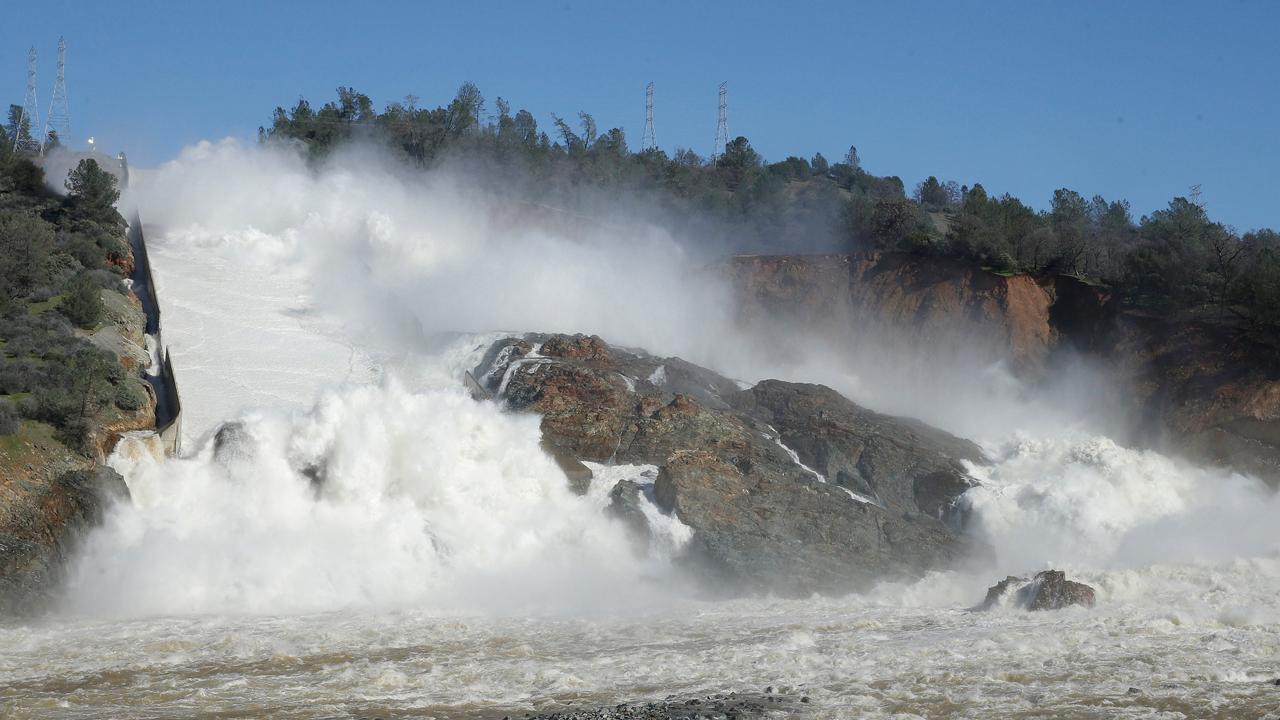Fox News Flash top headlines for Nov. 3
Fox News Flash top headlines for Nov. 3 are here. Check out what's clicking on FoxNews.com
Trouble is brewing upstream.
An extreme storm in the future could threaten a major earthen dam in Southern California, sending water flooding into communities in the Mojave Desert that are home to hundreds of thousands of people, according to officials.
The U.S. Army Corps of Engineers said in a news release on Friday that the federal agency has changed the risk characterization of the Mojave River Dam located northeast of Los Angeles from "low" to "high urgency of action" after a recent risk assessment.
“The dam has never experienced spillway flow or a flood event that has loaded the dam significantly,” Col. Aaron Barta, commander of the Corps’ Los Angeles District, said in a statement. “This is a storm that is unlikely to occur, but it is nonetheless a real possibility and one we must be prepared for."
CALIFORNIA POLICE RIP DRONE PILOT AS DEVICE GETS IN WAY OF WILDFIRE RELIEF EFFORTS
The earthen dam was built in 1971 near the San Bernardino Mountains, and was "designed and constructed consistent with the standards of the day," according to federal officials.

The Mojave River Dam, pictured in this undated photo, was built in the 1970s near the San Bernardino Mountains. Officials said Friday the dam could fail during an extreme storm, causing flooding in Mojave Desert communities. (U.S. Army Corps of Engineers)
"It continues to operate as it was designed and reduces risk for more than 16,000 people and $1.5 billion in property," the agency said.
The 200-foot dam has never been breached, but an assessment done in 2018 found that during an extreme storm, water could flow over the top of the structure, causing it to erode and potentially fail. If the dam were to fail, it would threaten the communities of Hesperia, Apple Valley, Victorville and Barstow, located adjacent to the Mojave River that is home to about 300,000 people.
A potential dam failure could generate flooding that could even impact the town of Baker, located more than 140 miles downriver.
Luciano Vera, a spokesman for the Los Angeles district of the Army Corps of Engineers, told the Associated Press that the chances of a storm that could overtop the dam are small, about 1-in-10,000.
But Vera added just because chances are small doesn't minimalize the threat.
"All it takes is one event...one Katrina, one Hurricane Harvey,” Vera told the AP. “These storms are happening more and more, so this is our way of looking toward the future.”
CALIFORNIA GOVERNOR PLEADS WITH RESIDENTS TO STOP TARGETING UTILITY WORKERS
The Army Corps said in a news release it is evaluating interim risk-reduction measures associated with a potential overtopping of the dam and anticipates that some of those measures will be in place ahead of this year's winter rains. The Army Corps has been looking at all of its 700 dams nationwide in the wake of Hurricane Katrina's devastation in 2005.
The Army Corp's LA District owns and operates 17 dams across California, Arizona and Nevada that reduce the risk of flooding for about 7 million people and $200 billion in the property. Those dams are "reviewed periodically" and rated according to the age and condition of the dam, in addition to potential consequences. The federal agency's dams range from low to "very high urgency of action."
In the wake of Friday's announcement, the Corps also said that it is "actively coordinating" with partners and coordinating public outreach as part of interim risk-management strategies.
"We're working closely with San Bernardino County, Apple Valley, Victorville, Hesperia and other downstream agencies to improve flood-risk awareness and emergency preparedness," said Kristen Bedolla, Dam Safety Program manager for the LA District. "Community preparation also is a key component in reducing flood risk.”
CLICK HERE FOR THE FOX NEWS APP
In May, the Corps upgraded the risk characterization of Prado Dam to high urgency. That dam is located on the Santa Ana River in the Los Angeles suburb of Corona. Dozens of Southern California cities with about 1.4 million people live downstream. Work to improve the dam has been underway since 2002 to increase the amount of floodwaters and sediment it can store.
In 2017, some 200,000 people in three Sierra Nevada counties in Northern California were forced to evacuate after spillways at the Oroville Dam crumbled and fell away during heavy rains.
Flooding didn’t happen, however, and the dam and associated spillways have since been repaired.
The Associated Press contributed to this report.












































